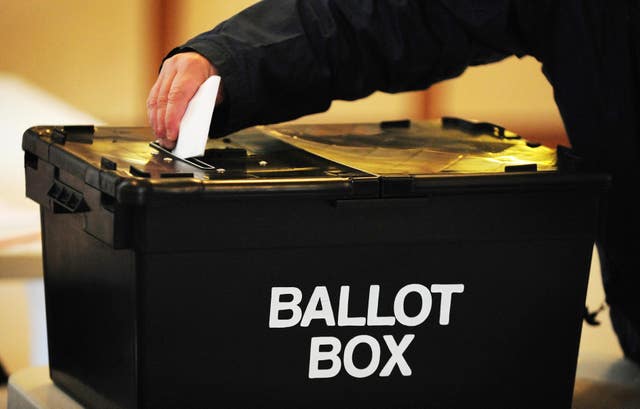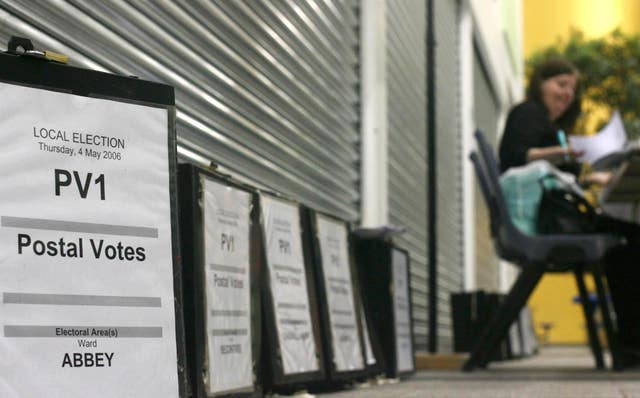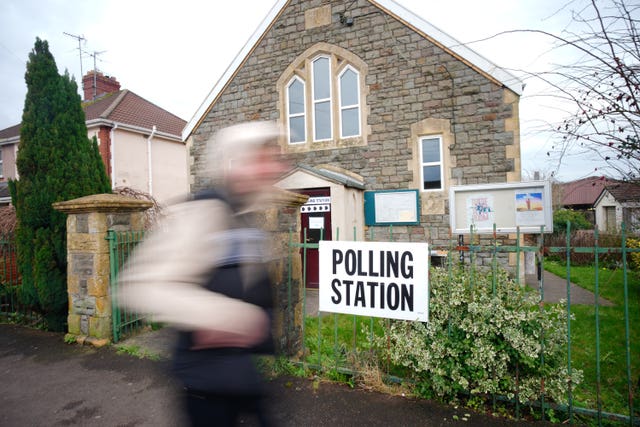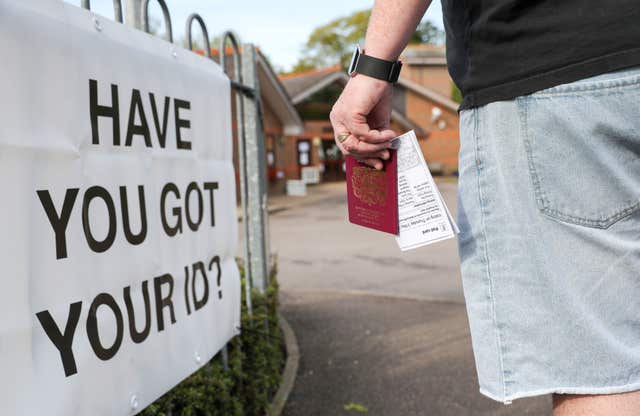How do I vote on election day?
Ballots can be cast in person, with a postal vote or by a proxy
To have your say on who should become your local Member of Parliament in the General Election on Thursday July 4 you must first register to vote.
Everyone who is on the official electoral register then has the choice of three voting methods: In person, by post, or by appointing a proxy to vote on their behalf.
– How do I register to vote?
You must be 18 years old or older to vote in a UK general election, although the age limit is younger for local and devolved parliament elections in Scotland and Wales. There is no upper age limit.

A voter registration pack
Up to 12 working days before polling day – which for the upcoming General Election is Tuesday June 18 – you can register to vote by either going to this link or by following the instructions on how to apply using a paper form via this link.
You do not have to re-register ahead of each election, although you should register again if you have moved house.
– What does it mean to be registered to vote?
If you register to vote your name is put on the electoral register, which is a list of names and addresses of everyone who is eligible to vote.
You can be fined if you have been asked to register to vote but do not do so, unless you give a valid reason. However, in the UK it is not compulsory to the cast a vote.
There is both an “open” and a “full” version of the register. Anyone can view the open register, but you can opt out of having your name on this register.
The full electoral register is used for administering elections and campaigning activities by political parties, but can also be used to summon people to serve on juries in England, Wales and Scotland, and for preventing and detecting crime.
According to a 2023 report from the Electoral Commission – the independent body which oversees elections and regulates political finance in the UK – potentially up to eight million people across the UK are not correctly registered at their current address.
– What are the different ways of voting?
You can vote by post, you can vote by proxy where someone else casts your ballot on your behalf, or you can vote in person.
– How does voting in person work?
To vote in person you must go to a polling place and fill out the ballot you are given and place it in a ballot box. Ahead of the election you will be sent a poll card which tells you where your polling station is. You cannot vote at a different polling place to the one you are assigned.
You do not need to bring your poll card with you, unless you have an anonymous entry in the electoral register to protect you from harm. If you have lost your poll card and do not know your polling station you can find it on the Electoral Commission’s website here.
Inside the polling station staff will guide you on how to cast your vote. You will need to tell them your name and address – and show a valid form of photo ID – so they can check you against the electoral register.
You will be handed one or more ballot papers with a list of candidates or options, and shown to a private polling booth where you put a cross next to your preferred candidate.
You then fold your ballot paper in half and drop it into the ballot box. If you make a mistake you can get a new ballot paper from the staff, but only if you have not put your ballot in the box yet.

To vote in person you go to your polling station and put your vote in a ballot box
– How does voting by post work?
You can apply for a postal vote ahead of the election. You do not need to give a reason, unless you live in Northern Ireland.
Around three weeks before polling day, after the deadline to become a candidate has passed and once the ballot papers are printed, you will be sent a postal vote pack in the post.
You should follow the instructions provided and post your ballot back as soon as possible. If you forget to post your ballot before election day you can hand it in to your local polling station before 10pm on election day. If you do this you will need to complete a form.
You can apply for a postal vote by following the instructions via this link. You have until 5pm, 11 working days before polling day to apply for a postal vote. In the 2024 general election that means 5pm on Wednesday June 19.

Postal vote ballot boxes await counting
– How does voting by proxy work?
You can apply to allow someone else to vote on your behalf, which is known as a proxy vote. Unlike with postal votes there are some criteria which you must meet to be allowed to apply for a proxy vote.
These include you being away on polling day, being registered as an overseas voter, having a medical issue or disability, or not being able to vote because of work or military service.
You can apply for a proxy vote by following the instructions via this link. You can do so until 5pm on the day which is six working days before the election in England, Scotland or Wales – that means Wednesday, June 26 2024, for the General Election – or 14 days before election day in Northern Ireland.
You can also apply for an emergency proxy vote until 5pm on election day in certain circumstances.
Your proxy voter must be someone who is both registered to vote and allowed to vote in that type of election.

Your proxy will go to the polling station to vote for you
– Can I vote in the UK if I live abroad?
If you are a British or eligible Irish citizen you are allowed to vote in UK parliamentary elections even if you live abroad. You need to have previously lived in the UK or been registered to vote in the UK.
You can register to vote in the UK no matter how long ago you left. You can apply by following the instructions at this link.
Once you are registered you can either vote by post or by proxy – or in person if you are due to be in the UK on polling day. Unlike some countries, Britons abroad cannot vote at the British embassy in the country where they now live.
The application system is slightly different for people whose last address was in Northern Ireland. You can read more about that by following this link.
– Do I need to bring ID to the polling station?
Since April 2022 you have needed to show a valid form of photo ID when you are voting in person in some elections, including UK parliamentary elections. These include UK and EU passports and driving licences.

A voter carries his passport along with his poll card as he makes his way to vote
A full list of valid IDs can be found at this link. If you do not have any of these forms of IDs you can apply for a Voter Authority Certificate by following this link.
You can still use your ID if it has expired but the photo on it must still look like you.
When you are in a polling station you will be asked to briefly remove any face coverings so that staff can check you resemble the photo on your ID. This includes face coverings worn for religious or medical reasons.
You can ask for this check to be made in private and by a female member of staff. If you feel uncomfortable showing your face, the Electoral Commission suggests you can appoint a proxy voter on your behalf or apply for a postal vote.
– When is my polling station open?
Polling stations open at 7am on election day and close at 10pm.
However, the Electoral Commission says if you are in a queue at your polling place at 10pm you will still be allowed to vote, even if you have not been issued with a ballot paper yet.
Links
Electoral Commission – UK parliamentary general election called (archived)
Gov.uk – The electoral register and the ‘open register’ (archived)
Electoral Commission – UK Parliamentary general election media guide (archived)
Gov.uk – register to vote (archived)
Electoral Commission – register to vote (archived)
Electoral Commission – 2023 report: Electoral registers in the UK (archived)
Gov.uk – How to vote, overview (archived)
Gov.uk – How to vote, voting in person (archived)
Electoral Commission – handbook for polling station staff (archived)
Electoral Commission – elections in your area (archived)
Vale of White Horse District Council – how do I vote in a polling station? (archived)
Gov.uk – How to vote, voting by post (archived)
Electoral Commission – how to vote by post (archived)
Electoral Commission – apply to vote by post (not archived for voter security reasons)
Gov.uk – How to vote, voting by proxy (archived)
Electoral Commission – voting if you live overseas (archived)
Gov.uk – Photo ID for voting (archived)
Gov.uk – Apply for photo ID to vote (not archived for voter security reasons)
Electoral Commission – checking your photo ID if you wear a face covering (archived)
Polling stations opening times (archived)
The Press Association
Latest posts by The Press Association (see all)
- BBC to air two-part Call The Midwife Christmas special - December 23, 2024
- 6 mind sports to exercise your brain and keep you sharp - December 20, 2024
- Quiz: What classic Christmas food or drink are you? - December 20, 2024
- Leftover turkey and watercress pie - December 20, 2024
- Catherine and William choose family shot for Christmas card photograph - December 19, 2024




















